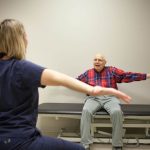Sage Outpatient is now offering Fiberoptic endoscopic evaluation of swallowing (FEES)!
What is FEES?
Fiberoptic endoscopic evaluation of swallowing, or FEES, is a procedure that helps the speech language pathologist (SLP) assess your ability to swallow and see what happens in your mouth and throat when you swallow. An SLP can perform this procedure with a doctor, likely an ear, nose, and throat doctor or alone. A small tube, with a camera and light attached, is passed into your nose and down your throat. The flexible endoscope is connected to a computer that lets the SLP see a picture of your throat and allows the SLP to view the test again later if needed. The SLP will have you eat and drink different foods and/or liquids during this procedure and will view parts of your throat as you swallow. Food coloring may be used to dye the food and liquid so that it is easier to view on the computer screen.
According to the American Speech-Language Hearing Association (ASHA), endoscopy lets the SLP see:
- If food goes into your airway instead of your stomach, called aspiration
- What parts of your mouth and throat may not work well
- What kinds of food and drink are safest for you to swallow
- If certain positions or strategies help you swallow better
Why might I need a fiberoptic evaluation of swallowing?
If you have trouble swallowing, also called dysphagia, then you may need this test. You may also need this test if you have a medical condition that may put you at high risk of dysphagia, even if you are not displaying any symptoms of dysphagia. Common conditions include: head and neck cancer, head injury, Parkinson’s disease, stroke, or other neurologic conditions, muscular dystrophies, etc.
Signs of dysphagia may include: (American Speech Language Hearing Association, n.d.)
- Drooling and poor oral management
- Food or liquid remaining in the mouth after the swallow
- Inability to maintain lip closure which may lead to food and/or liquids leaking from the mouth
- Complaints of food “sticking”
- Globus sensation or complaints of “fullness” in the neck
- Complaints of pain when swallowing
- Wet or gurgly sounding voice during or after eating or drinking
- Coughing during or right after eating or drinking
- Difficulty coordinating breathing and swallowing
- Recurring aspiration pneumonia/respiratory infection and/or fever
- Extra effort or time needed to chew or swallow
- Changes in eating habits- specifically, avoidance of certain foods/drinks
- Weight loss or dehydration from not being able to eat enough
If you believe that you are at risk for dysphagia, please contact a speech language pathologist at Sage Outpatient to assess your swallowing. Dysphagia assessment and treatment can improve your quality of life, increase your safety while eating and drinking, and can potentially decrease your risk of developing aspiration pneumonia. All speech therapists at Sage Outpatient have specialized training in dysphagia therapy.





